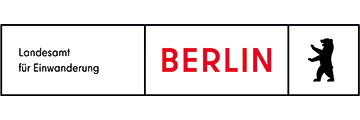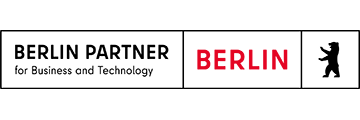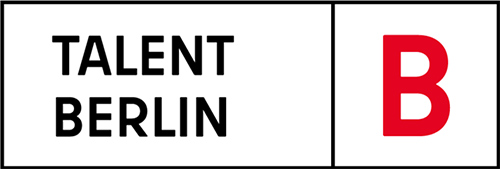Business Immigration Service
The Business Immigration Service enables the quick and uncomplicated issuing of residence permits for entrepreneurs and qualified specialists.
Berlin-based businesses can quickly and easily find answers to all questions relating to residence permits for their employees and family members from the Business Immigration Service (BIS) and submit the corresponding applications to the relevant department of the State Office for Immigration. The same applies for foreign investors and founders who want to become economically active here in Berlin.
Service
- Information about the topic of preliminary approval and visas (Berlin partners and IHK)
- Information and advice regarding the topic of residence permits (Berlin partners and IHK)
- Review, creation and issue of residence permits (Foreigners’ Registration Office - LEA)
- Support in applying for accommodation at the Citizen’s Office (Bürgeramt)
The BIS is a company service and can be used exclusively by businesses, founders and independents who have registered as customers with the Berlin Immigration Office. This also applies for member companies of the Berlin Chamber of Commerce and Berlin Chamber of Crafts.
Registration
Not yet registered but want to use the Business Immigration Service?
Please check this website:
www.berlin.de/einwanderung/service/business-immigration-service/
(Currently only available in German.)
Registration as a new customer in the BIS
(Currently only available in German.)
Students and other individuals should contact the
Berlin Immigration Office
Have you already registered?
Then please use this page:
Online application for registered BIS customers
(Currently only available in German.)
Cooperation partners
The Business Immigration Service (BIS) is a unique network of participants from Berlin’s economic and administration sector for visa and residency queries. Fast communication and transparent, solution-oriented work processes ensure cooperation at its best.
Preliminary information - what, when and how?
As an initial overview, we have compiled information about the topic of visas and residence permits for employees:
The amended Skilled Immigration Act
Amendments to the Skilled Immigration Act (FEG) came into force on 11/18/2023, 03/01/2024 and 06/01/2024 respectively. You can find detailed information on this on the website of Make it in Germany.
Skilled workers:
The new FEG identifies three paths for the immigration of skilled workers:
Qualification - Experience - Potential
For skilled workers with academic university degrees, both the university and the degree obtained must be recognized:
The degree should be listed in the anabin database. The university must be rated as “H+” and the degree should be comparable to a German degree qualification. Create a PDF of the respective assessment and submit it together with the required documents.
There are a number of new regulations on the subject of professional qualifications/non-academic professional certificates: Please refer to the pages of Make it in Germany.
For more information on whether a non-academic degree is recognized in Germany, please see www.anerkennung-in-deutschland.de.
With a statement of recognition for their professional qualification and a job offer, skilled workers abroad can apply directly for a visa for employment. If the German authorities have only partially recognized the professional qualification, interested parties can obtain a visa for the purpose of further training and qualification if they have a job offer in Germany.
2+2 Regulation:
Anyone with at least two years of professional experience and a vocational qualification recognized by the state in their country of origin with at least two years of training should be able to immigrate as a worker. In the future, the professional qualification will no longer have to be recognized in Germany – this means less bureaucracy and therefore shorter procedures.
Job search:
Skilled workers with sufficient German language skills and financial means to support their livelihood can apply for a 6-month visa to look for a job. In addition, an "Opportunity card" based on a points system will be introduced from June 2024. Read more: Make it in Germany.
Special regulations apply to professionals older than 45 years. Those coming to Germany for the purpose of employment must submit a work application with a specified minimum salary or proof of an adequate pension scheme.
Vocational training in Germany:
Apprenticeship search:
People under the age of 35 can come to Germany for up to nine months, to apply for a training place if their school-leaving certificate entitles them to study at a university, they have German language skills (level B1) and the financial means to support their livelihood. This residence permit allows up to 20 hours of employment on a trial basis, after which or during which a job should be offered.
Further information:
The „Beschleunigte Fachkräfteverfahren“ (accelerated skilled worker procedure):
- Fee €411
- The application process does not start abroad, but in Berlin (Germany) by the employer
- The LEA obtains approval from the Federal Employment Agency and checks everything required, issues a preliminary approval
- The employer sends this document to the applicant who presents it to the embassy
- The embassy will arrange an appointment within three weeks and take a decision on the visa within an additional three weeks
- The accelerated procedure is also available for the immigration of family members if joint arrival - within three months - is envisaged (€411 per skilled worker)
In principle, the following must be observed for employment:
- A binding offer of employment or training is required.
- German language skills are only partially required.
- Work experience + post-qualification = qualification
- The employer must make sure that the specialist has a valid residence permit and keep a copy of it in the personnel file.
- If the contract ends prematurely, both the specialist and the employer must inform the LEA promptly.
(Sources: Landeseinwohneramt, Auswärtiges Amt, BMI, BMAS und MiiG)
Visa and residence permit - what is the difference?
A visa entitles the holder to enter the Federal Republic of Germany and is applied for at the responsible German mission abroad, i.e. the German embassy or consulate general, in the home country or in the country of regular residence. The Schengen visa (category “C”) allows a short-term stay of up to 90 days within 180 days. A national visa (category “D”) is issued for persons who wish to study, work or reside permanently in the Federal Republic of Germany.
A residence permit entitles the holder to reside in Germany and includes or excludes permission to pursue gainful employment, depending on the legal basis of the residence permit. Residence permits can only be applied for at an immigration office. In Berlin, the State Office for Immigration is responsible for this. The responsibility of the immigration office depends on the place where the person concerned has registered under the registration law. A residence permit will only be issued if the person can also provide proof of valid health insurance.
Both a visa and a residence permit are issued for a specific purpose and are valid for a fixed period of time.
Overview of the relevant visa and residence titles for employees
Nationals who require a national visa (category “D”) to enter Germany or who cannot change their status (tourist) in Germany despite being entitled to enter without a visa must first apply for a national visa in their home country or country of residence.
Nationals who enter the country without a visa and can change their status here (tourist to employee/self-employed person) must have applied for and received a corresponding residence permit from the State Immigration Office before taking up work.
- Overview of visa requirements/exemptions - Federal Foreign Office
- Residence permit for the purpose of employment
Residence title for the purpose of employment based on §18a immigration law
A residence permit for employment can be issued if you have a non-academic training and a specific job offer/employment contract and the Federal Employment Agency has approved the employment.
Residence title for the purpose of employment based on §18b immigration law
A residence permit for employment can be issued if an academic qualification and a concrete job offer/employment contract exist and the Federal Employment Agency has approved the employment.
Residence title for the purpose of employment based on §18g immigration law (EU Blue Card)
The following requirements must be met for a Blue Card to be issued:
- a German or foreign university degree recognized in Germany,
- a specific job offer / a signed employment contract that is appropriate to the training
- a gross annual salary of €48,300
The salary threshold of the EU Blue Card for so-called shortage occupations, especially in STEM* and medical fields, is slightly lower at €43,759.80 gross. In these cases, consent from the Federal Employment Agency for employment is necessary.
* Science, Technology, Engineering or Mathematics
The list of shortage or bottleneck occupations also includes:
- Manufacturing, mining, construction, or distribution managers, ICT service managers
- Professional services managers, such as childcare or health services managers
- Veterinarians, dentists, pharmacists
- Nursing or midwifery professionals
- School and out-of-school teachers and educators
In addition, IT specialists without an academic degree but with 3 years of relevant professional experience within the last 7 years as well as academic career starters can also apply for a Blue Card.
Further information:
www.make-it-in-germany.com/de/visum-aufenthalt/fachkraefteeinwanderungsgesetz
Extension and change of residence permit for employees
Extensions of the residence permit and changes to the basis of the residence permit for employment, such as a change of employer or a change of position in the company, may require the approval of the Immigration Office, i.e. a new application.
For residence titles for employment according to §18a and §18b, an application for a change of employer or for a change of position in the company must only be submitted within the first two years of employment. If you hold an EU Blue Card (§18g), this is only required for the first year.
In the case of an EU Blue Card for shortage occupations (Section 18g (1) sentence 2 or Section 18g (2)), an application for a change of employer is only required in the first year.
Investors/self-employed, founders and freelancers
Residence permit for talents with a startup scholarship:
In future, specialists within the meaning of Section 18 (3) Residence Act (AufenthG) can receive a residence permit for up to 18 months to set up a company if they are granted a scholarship from a German scientific organization or public body for this purpose.
In selected cases, the Business Immigration Service of the LEA Berlin also issues residence permits for investors/self-employed persons/founders. The connection is usually established via Berlin Partner for Business and Technology or via the Berlin Chamber of Industry and Commerce. In these selected cases, there must be a justified economic interest on the part of the State of Berlin.
Freelancers and cultural workers can contact their respective state department of the State Office for Immigration.
Application for Freelancers
Your contact at the Industrie- und Handelskammer Berlin:
Maxim Kempe
Starter Center und Startups
+49 30 31510-298
maxim.kempe(at)berlin.ihk.de
Your contact at Berlin Partner for Business and Technology:
Marion Schönicke
Talent | Business Immigration Service
+49 30 46302-432
marion.schoenicke(at)berlin-partner.de
Rouven Sperling
Projekt Manager Talent
+49 30 46302-229
rouven.sperling(at)berlin-partner.de
David Kremers
Head of Talent Division
+49 30 46302-353
david.kremers(at)berlin-partner.de
| For existing companies: Berlin Partner's areas of expertise | For entrepreneurs: CCI sectors |
| Health Care Industries / Life Sciences ICT Media and Creative Industries Transport, Mobility, Logistics Energy technologies Photonics Chemicals and plastics Food and beverage industries Service industries | Construction and Real Estate Industry Services Digital Economy Health Industry Trade Industry Creative Industry Tourism Transport |
Other residence titles
Other residence permits that may be relevant for companies looking for foreign emloyees:
- Residence permits for students (§16b immigration law)
Based on their residence permit, foreign students are allowed to take up employment totalling no more than 140 days or 280 half-days per year, and to take up part-time student employment. - Residence permit for job seekers after a stay in German (§20 immigration law)
A person who holds this residence permit for up to 18 months is allowed to start working immediately. Changing this residence permit into one for employment reasons is much easier due to the German university degree. - Family reunion to Germans (§28 Residence Act), to foreigners with a valid residence title (§30 Residence Act) or to EU citizens (§3 Freedom of Movement Act EU)
People who hold a valid residence permit for family reunion (marriage or marriage-equivalent partnerships) may work without restriction.
Recognition of foreign university degrees
For foreign university degrees that are not recognized as equivalent in the anabin database, a certificate evaluation can be applied for via the Central Office for Foreign Education (ZAB). This application can be submitted digitally. The processing times for the certificate evaluation are approx.
- 3 months for a regular application
- 2 months for a certificate evaluation in the accelerated specialist procedure
- 2 weeks for a certificate assessment for an EU Blue Card
Good to know
Incomplete applications lead to considerably delayed processing! Please only send applications with all required documents to the Immigration Office (LEA).
The LEA Berlin offers digital application forms for many of its services, which can be used to upload documents and pay the required fee directly.
Other applications can be submitted via the respective contact form of the responsible department. You can also use a contact form to request an appointment.
www.berlin.de/einwanderung/en/services/our-services
Sooner rather than later: Even though the BIS cooperation partners work hand in hand to provide the best possible support for Berlin's economy, the required documents must be submitted at an early stage.
Temporary residence permits from other EU countries have the same effect in Germany as a Schengen visa: Entry and stay of up to 90 days for tourism purposes are permitted.
If an applicant has already stayed in Germany for a longer period of time (no tourist stay), delays may occur. In such cases, the embassy will involve the „Einreisestelle“ of the Berlin Immigration Office, which may take up to three months.







